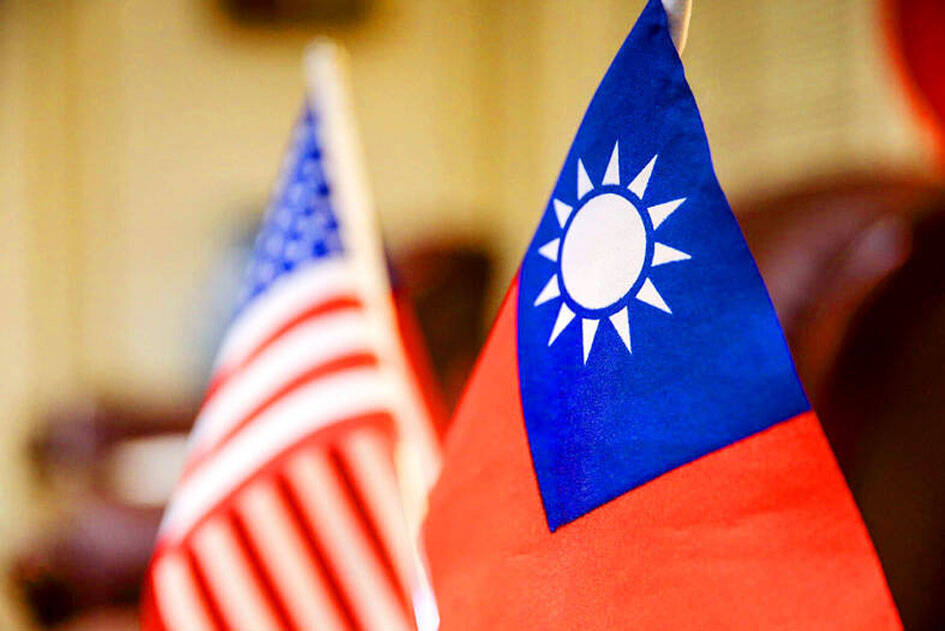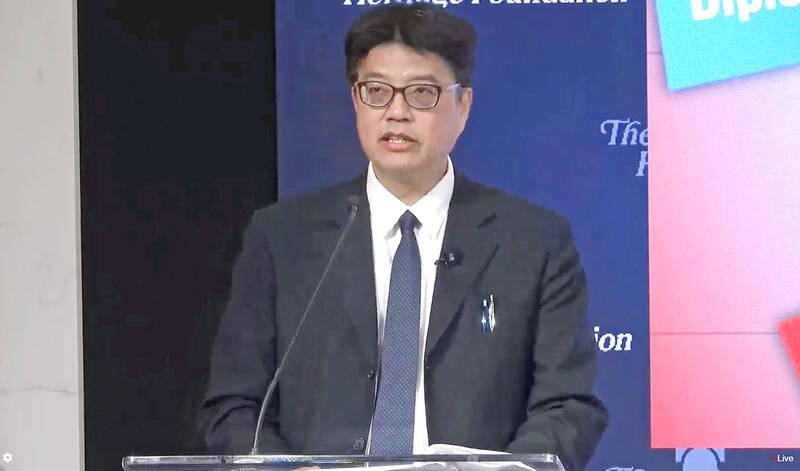The US has not changed its Taiwan policy and would continue to support the nation, a source yesterday cited US Department of State officials as telling a Mainland Affairs Council (MAC) delegation earlier this month.
MAC Minister Chiu Chui-cheng (邱垂正) on Sept. 6 led a delegation to Washington and met with officials from US federal agencies and the US Congress, as well as the US Department of State’s Office of China Coordination, and eight members of the US House of Representatives’ Select Committee on Strategic Competition Between the United States and the Chinese Communist Party (CCP), the source said.
The MAC delegation also met with lawmakers in Chicago, including Illinois House of Representatives Speaker Chris Welch and Illinois Comptroller Susana Mendoza, they said.

Photo: Cheng I-hwa, Bloomberg
The US side green-lighted Chiu’s public speech, they said.
Washington was concerned about China’s multifaceted pressure and military threats toward Taiwan, they added.
The US side stressed that it has not changed its Taiwan policy, although US President Donald Trump’s administration would communicate with China to develop stable bilateral relations, the source said.

Photo: screen grab from the Heritage Foundation’s Web site
Taiwan should understand the necessities of US-China relations’ current situation, the source quoted US officials as saying, adding that they said Washington would continue to support Taiwan.
The US side did not mention any “Lai skepticism” — a term used to describe holding doubts about President William Lai (賴清德), the source said.
Instead, the Taiwanese delegation mentioned “US skepticism,” referring to the CCP using the US’ “reciprocal” tariffs, Taiwan Semiconductor Manufacturing Co’s (台積電) investment in the US and other issues to drive a wedge between Taiwan and the US, and expressed hope that the US side can provide assistance in dealing with it, they said.
The delegation also told the US side that Taipei is “neither humble nor arrogant” and is committed to maintaining the “status quo,” they said.
The delegation also told US officials that the government upholds former president Tsai Ing-wen’s (蔡英文) “four commitments” and Lai’s “four pillars” plan, they said.
Taiwan would also continue to implement Lai’s 17 major strategies to maintain peace, stability and prosperity in the Strait, the delegation told the US side, they added.
They told US officials that Chinese President Xi Jinping (習近平) has increased pressure on Taiwan in his third term, because he wants to achieve what he sees as the CCP’s “historical mission,” the source said.
“The nature of cross-strait relations has changed in Xi’s third term, and the CCP would continue to exert pressure on Taiwan, so hopefully the US, which provides the biggest military support to Taiwan, and other democracies can fully understand the situation,” they said.
The delegation also told the US side that a MAC survey showed that the majority of Taiwanese support maintaining the “status quo” in cross-strait relations, and that mainstream public opinion in Taiwan is that the nation’s status should be decided by the 23 million Taiwanese, they said.
Taiwanese do not want the government to accept the CCP’s political preconditions for official exchanges, they added.

People can preregister to receive their NT$10,000 (US$325) cash distributed from the central government on Nov. 5 after President William Lai (賴清德) yesterday signed the Special Budget for Strengthening Economic, Social and National Security Resilience, the Executive Yuan told a news conference last night. The special budget, passed by the Legislative Yuan on Friday last week with a cash handout budget of NT$236 billion, was officially submitted to the Executive Yuan and the Presidential Office yesterday afternoon. People can register through the official Web site at https://10000.gov.tw to have the funds deposited into their bank accounts, withdraw the funds at automated teller

PEACE AND STABILITY: Maintaining the cross-strait ‘status quo’ has long been the government’s position, the Ministry of Foreign Affairs said Taiwan is committed to maintaining the cross-strait “status quo” and seeks no escalation of tensions, the Ministry of Foreign Affairs (MOFA) said yesterday, rebutting a Time magazine opinion piece that described President William Lai (賴清德) as a “reckless leader.” The article, titled “The US Must Beware of Taiwan’s Reckless Leader,” was written by Lyle Goldstein, director of the Asia Program at the Washington-based Defense Priorities think tank. Goldstein wrote that Taiwan is “the world’s most dangerous flashpoint” amid ongoing conflicts in the Middle East and Russia’s invasion of Ukraine. He said that the situation in the Taiwan Strait has become less stable

REASSURANCE: The US said Taiwan’s interests would not be harmed during the talk and that it remains steadfast in its support for the nation, the foreign minister said US President Donald Trump on Friday said he would bring up Taiwan with Chinese President Xi Jinping (習近平) during a meeting on the sidelines of the APEC Summit in South Korea this week. “I will be talking about Taiwan [with Xi],” Trump told reporters before he departed for his trip to Asia, adding that he had “a lot of respect for Taiwan.” “We have a lot to talk about with President Xi, and he has a lot to talk about with us. I think we’ll have a good meeting,” Trump said. Taiwan has long been a contentious issue between the US and China.

Japanese Prime Minister Sanae Takaichi yesterday lavished US President Donald Trump with praise and vows of a “golden age” of ties on his visit to Tokyo, before inking a deal with Washington aimed at securing critical minerals. Takaichi — Japan’s first female prime minister — pulled out all the stops for Trump in her opening test on the international stage and even announced that she would nominate him for a Nobel Peace Prize, the White House said. Trump has become increasingly focused on the Nobel since his return to power in January and claims to have ended several conflicts around the world,